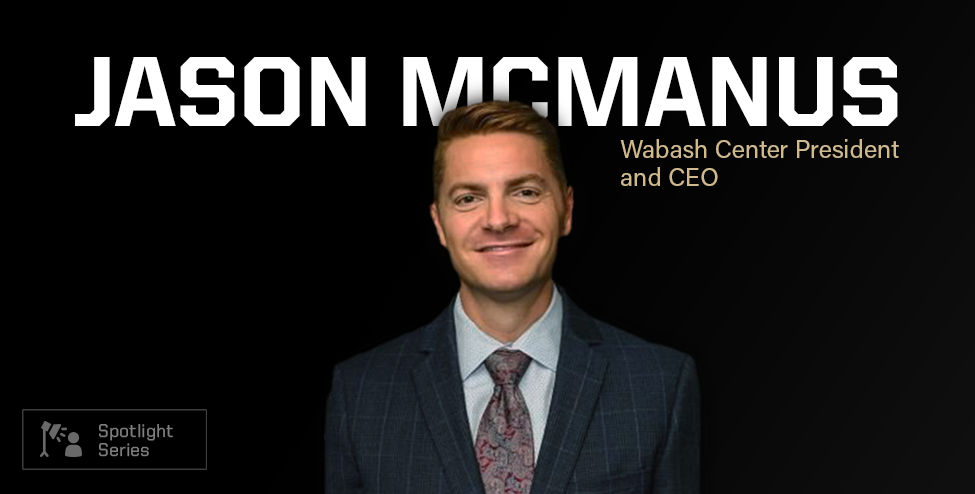Life Without Limits: Spotlight on Engaged Community Partner Jason McManus of Wabash Center

Engaged community partner leaders like Jason McManus strive to provide experiential opportunities for students to take academic inquiry beyond the classroom and impact the community.
“There is a wonderful elegance to [service-learning and engagement] as it allows for dissonance between academic inquiry and practical application. Indeed, it is often where this dissonance is discovered that new, emerging practices come about,” said Wabash Center President and CEO, Jason McManus.
While preparing for his lighting talk, “Life Without Limits: How Academic Inquiry, Innovation, and Technology are Changing the Game for People with Disabilities” at the upcoming 2024 Engagement and Service-Learning Summit, McManus took some time to share highlights of his work with Wabash Center and Purdue. For McManus, inspiration to make a difference in his community began when he was a child.
“I grew up in a household with a person with a disability—my oldest brother was born profoundly hearing impaired due to a Rubella outbreak in the town I grew up in. I watched him experience micro indignities and other barriers related to misconceptions about what people with disabilities are capable of. This was very formative. As I navigated a career in the human services field, I came to see how much more work there was to do in preparing persons with disabilities to overcome these barriers and make the communities in which they live more accessible, accepting, and inclusive. This led me to Wabash Center, which is uniquely positioned to serve persons with disabilities, as it has been doing in the Greater Lafayette Area for 70 years,” said McManus.
McManus began his career in the Juvenile Justice System, serving as a Juvenile Probation Officer in Hamilton County Indiana. McManus successfully implemented the first school-based probation program in the county, aligning with area high schools to curb truancy, school violence, and substance abuse. After eight years in the Juvenile Justice System, McManus joined the executive team at the Indiana Department of Child Services where he oversaw historic legislation in 2008. McManus’ work with children and families led him to serve as the Chief Operating Officer at Damar Services, Inc., a large-scale not-for-profit in Indianapolis that has been serving children and adults with intellectual and developmental disabilities, like Autism, for more than 50 years. McManus oversaw Children’s Residential Services, Community and Home-based services, Foster Care, Older Youth Services, Damar Freeway Academy, Adult Services, including more than 40 Medicaid waiver sites throughout the Indianapolis Area.
McManus was drawn to the Wabash Center because of its mission to serve people with disabilities across a broad spectrum of ages and abilities. The organization began in 1953, and McManus has shepherded it to significant growth.
Connecting individuals Wabash serves with opportunities for self-advocacy and employment, fostering independence, and breaking down community barriers that prevent persons with disabilities from participating in full inclusion are some of the most important things the Wabash Center does.
Jason McManus
In McManus’ tenure, the Wabash Center has accomplished a successful $3,000,000 capital campaign for Grant’s House, “a state-of-the-art facility for children and young adults with disabilities, designed aesthetically, and functionally around their needs,” commented McManus.
According to McManus, the Wabash Center was also able to open an Autism Clinic to leverage more than “70 years of experience providing services and support to persons with disabilities to address the rising prevalence of autism spectrum disorder.”
McManus cited the Wabash Center’s deepening relationship with Purdue University as an important milestone, explaining that he is “deeply grateful and proud” of the many partnerships Wabash has with Purdue, adding that the relationship has allowed Wabash and Purdue to “draw on our collective expertise, participate in important research informing the disability field, and provide clinical opportunities for students interested in pursuing a career in disability services.” He shared that a collaboration with Purdue’s Autism Research Center was a standout experience.
“We were engaged with a class at the Purdue Autism Research Center that was researching and vetting software programs that assist adults with disabilities in obtaining daily living skills. When I met with the class to hear them report their findings, I learned that there was a consensus choice that was not unanimous and was asked by the students if they could give equal time for both the students who arrived at the consensus choice, and those with a dissenting view. It was really refreshing to see a discourse where there was clear disagreement articulated logically, passionately, and with deference and acknowledgement of another viewpoint. The students were truly invested in the outcome,” McManus explained.
McManus appreciates the student investment aspect of engagement and service-learning, and the opportunity students have to apply academic study in real time to a community need and translate what they learn into partnerships with local, non-profit organizations. He shared that after seeing the full lineup of speakers with whom he’ll be sharing the stage at the Summit, he is eager to learn more from them all and hear about their experiences with service-learning.
The Office of Engagement is excited to invite community partners, faculty, staff, and students from across Purdue’s campuses to the Engagement and Service-Learning Summit where we are celebrating “Giant Leaps, Local Impacts” with lightning talks by six incredibly engaged faculty, staff, students, and community partners! Register to attend the Summit today via https://www.purdue.edu/engagement/summit.